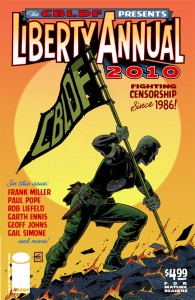
Comic Book Legal Defense Fund today filed a friend-of-the-court brief in Schwarzenegger v. EMA, urging the Supreme Court to affirm the Ninth Circuit’s decision that a California law banning the sale or rental of any video game containing violent content to minors, and requiring manufacturers to label such games, is unconstitutional.
The Comic Book Legal Defense Fund submits that, if allowed to stand, California’s law would reverse fundamental First Amendment principles by creating a new category of unprotected speech, diminishing the First Amendment rights of minors, and reducing First Amendment protection for new media. The CBLDF argues that the law under review is the most recent example of government improperly attempting to regulate content by using junk science, and calls upon a history of moral panics against media that includes the 1950s crusades against comics that crippled the industry and harmed the art form. The CBLDF asks the Supreme Court to deny California this attempt to roll back protections guaranteed by the First Amendment, as it and other courts have correctly done in the past.
Read on for the full release, and brief.

